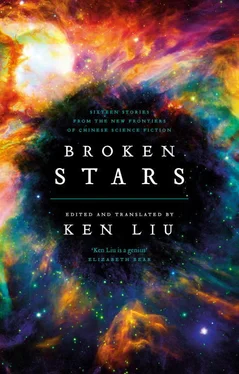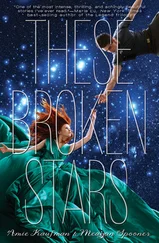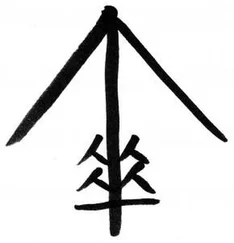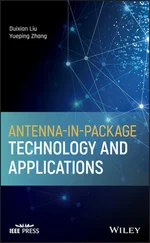During his presentation, Fei Dao compared this new wave of Chinese science fiction to a lonely hidden army. Perhaps it would have perished without anyone paying attention to it. Indeed, if no one from the literary establishment bothered to pick up a copy of Santi , or had the patience to read the labyrinthine narrative of Han Song’s bizarre story about China’s invisible reality, the new wave of Chinese SF could perhaps only serve as self-entertainment for SF authors and fans. But in July 2010, thanks to Han Song and Fei Dao, this lonely hidden army was brought to the center stage of a convention of literary elites.
Right after the roundtable, Theodore Huters (UCLA), a professor I respect tremendously, began to think about doing an anthology to introduce these new Chinese SF authors. He commissioned me to edit a special double issue for Renditions , a literary magazine that introduced some of China’s most famous authors to the world. It took me two years, with the support of dozens of writers and translators, to complete this job. In 2012, the Renditions special issue was published, featuring ten stories by contemporary Chinese SF authors. It’s about the same time that Ken Liu, the most devoted translator of Chinese science fiction, began to enter the field. Other publications, such as Pathlight , also ran special issues featuring translations of Chinese science fiction. In other countries, such as Italy and Japan, Chinese science fiction has also gained new life in new languages.
When Ken Liu’s translation of The Three-Body Problem appeared in 2014 and won the Hugo Award in 2015, this new wave of Chinese science fiction became an international sensation. What happened later is perhaps familiar to most of the readers: Obama and Mark Zuckerberg both praised the novel; its sequel, Death’s End , was on the bestseller list of the New York Times .
*
Scholars are usually a little late to trends. But this time, the tremendous popularity of Chinese science fiction is impossible to ignore. Within only three to four years, Chinese science fiction has quickly become one of the most prosperous subfields for China scholars. Major academic conferences such as MLA, AAS, ACLA, ACCL, and the like all feature panels, roundtables, workshops devoted to Chinese science fiction. As one of the first Chinese American scholars paying attention to this new development of the genre, I was frequently commissioned to contribute to academic journals/volumes in both the US and China (and France and Germany as well), edit special issues, and even organize conferences and workshops. I am not alone in this campaign. I have such comrades-in-arms as Hua Li, who wrote several articles on contemporary SF, and Nathaniel Isaacson, who recently published Celestial Empire: Emergence of Chinese Science Fiction , the first monograph completely devoted to the study of early Chinese science fiction. More importantly, an entire new generation of younger scholars engaged the topic seriously, producing more systematic research and presenting more provocative arguments. It was almost like a miracle: a new continent for scholarly adventure emerged in front of our eyes.
Still, I need to emphasize that the field has its own history. Its current momentum is new, but it still has a heritage that set up some framework for the contemporary research, just like this new wave that also has its precedents—at least a few short-lived booms that took place in the first decade of the twentieth century: the 1950s to 1960s as children’s literature in China, 1970s to 1980s in Taiwan, and a major revival on the mainland during the early Reform Era. However, the history of Chinese science fiction has never been a continuous one. It is full of gaps and interruptions caused by politics or the change of cultural paradigms. Each generation of new authors had to reestablish the paradigm. Only on a few occasions could they get access to earlier authors’ work, but they rarely received obvious, substantial influences from them.
But for literary scholars, the task is not just to test how earlier generations influenced later ones, or to try to create a literary history that pretends to be coherent and consistent. Literary scholars put more emphasis on texts and contexts. I need to pay homage to three scholars who made major research on the genre before its recent revival. In the early 1980s, German sinologist Rudolf Wagner published a lengthy article “Lobby Literature: Archeology and Present Functions of Science Fiction in China.” It mainly discusses science fiction of the early Reform Era. Wagner defined it as lobby literature without labeling it as propaganda, but gave a subtle and sympathetic analysis of the genre’s rich meanings at the turning point of China’s political situation. His article is an inspiring piece that connects the future-oriented SF to past history and present challenges.
By the end of the 1980s, Wu Dingbo collaborated with Patrick Murphy to publish the first translated anthology of Chinese science fiction from the 1980s, titled Science Fiction from China (New York: Praeger, 1989). Wu wrote an introduction that serves as a concise history of Chinese science fiction, presenting most of the important authors and advocates for the genre from the early twentieth century to the early 1980s. He spent more time introducing the rise and decline of Chinese SF during the early Reform Era. Wu’s introduction was the most complete discussion on the genre published in English by that time.
In 1997, David Der-wei Wang’s paradigm-making book Fin-de-siecle Splendor: Repressed Modernities of Late Qing Fiction, 1848–1911 (Stanford, 1997) was published. One of his chapters, “Confused Horizons: Science Fantasy,” is the defining study of late Qing science fiction, which was first promoted by Liang Qichao and later prospered for nearly a decade (1902 to 1911). Wang’s approach is to combine textual analysis and cultural history, looking into the imaginative and epistemological levels of the narrative. Wang’s study has had a deep impact on later scholars’ work on late Qing science fiction. It is no exaggeration to say that after Wang’s book was published there was a revival of scholarly interest in late Qing literature, including science fiction.
In China, the pioneer in Chinese science fiction studies is no doubt Wu Yan. He was almost the sole serious scholar working on the genre for decades before it received recognition from more scholars. In addition to a series of academic articles, Wu published in 2011 a monograph titled “Kehuan wenxue lungang” (Outline of Science Fiction Studies). Unlike Rudolf Wagner, Wu Dingbo, or David Der-wei Wang, Wu Yan focuses his study on contemporary Chinese science fiction writers, comparing them to Western authors and applying a number of theories (including cyborg, feminism, and globalization) to analyzing these writers. In China today, Wu Yan, as the only advisor qualified to advise Ph.D. students to do projects on SF, is definitely the leader of the community of Chinese science fiction researchers.
By the time Chinese science fiction began to gain international recognition, Wu Yan edited a special issue for Science Fiction Studies , a collection of about ten research articles covering the entire history of the genre in China, from late Qing science fantasy to Lao She’s Cat Country , from the 1980s to the very recent boom of the genre after 2000. Both Liu Cixin and Han Song also contributed to this special issue, which is a landmark in the development of the field.
My own research on Chinese science fiction is rather limited to contemporary works, particularly the New Wave, a term I borrowed from British SF history to baptize this new trend of the genre that shows both social concern and artistic innovations. It is a controversial definition, I know. I have published four articles in English (two translated into French and German), and numerous articles and essays in Chinese. In one recent article, “Representations of the Invisible: Poetics and Politics of Contemporary Chinese Science Fiction,” I argued that the trend called the New Wave grew out of the post-1989 political culture, and it has not only resurrected the genre but has also subverted its own conventions, which used to be dominated by political utopianism and technological optimism throughout nearly the entire twentieth century in mainland China. Contemporary science fiction reenergizes the genre by consolidating and reinventing a variety of generic conventions, cultural elements, and political visions—ranging from space opera to cyberpunk fiction, from utopianism to posthumanism, and from parodied visions of China’s rise to deconstructions of the myth of national development. In a peculiar way, Chinese science fiction has entered its Golden Age at the same time that it generates a new wave subversion of the genre. The new wave has a dark and subversive side that speaks either to the “invisible” dimensions of the reality, or simply the impossibility of representing a certain “reality” dictated by the discourse of mainstream realism. On its most radical side, the new wave of Chinese SF has been thriving on an avant-garde cultural spirit that encourages one to think beyond the conventional ways of perceiving reality and to challenge the commonly accepted ideas about progress, development, economic miracle, and nation and people.
Читать дальше












